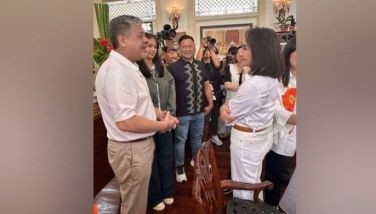Why clip the Supreme Court powers?
It has been said by a number of erudite and seasoned constitutionalists that, among the three branches of the Philippine government, the judiciary seems to be the weakest. The Executive, we might say, holds the crown and the sword, the President being the counterpart of kings and also the Commander-in-chief of the armed forces. The Congress holds the power of the purse because the legislature wields the budgetary powers. Even the budget of the Supreme Court must be approved by both houses of Congress even before the President signs it into the general appropriation act. The Supreme Court only has the power of the pen, when, by exercise of its inherent power of judicial review, it can declare as unconstitutional any act of congress or Presidential issuance.
Under Article VI of the Constitution, Congress has the powers to confirm or deny confirmation of any Presidential appointments of Cabinet members, Heads and members of Constitutional Commissions, ambassadors and consuls and generals of the armed forces, among others. Congress also has the sole power to declare a state of war, and ratify treaties. Under article VII of the same Constitution, the President has vast powers, which include the power of appointment, suspend the privilege of the writ of ''habeas corpus'' and place the whole country or any part thereof under Martial law, albeit subject to many restrictions and participation by Congress.
Under Article VIII, judicial power is vested in one Supreme Court and such other lower courts established by law. Congress has the power to define the powers of the courts but may not remove the powers of the Supreme Court enumerated under Section 5 of the same article. Therefore, the powers of the Supreme Court cannot be diminished by explicit constitutional prohibition. The Supreme Court members have security of tenure and no law can ever be passed undermining that tenurial security. The Supreme Court enjoys fiscal autonomy. One cannot weaken the Supreme Court without undermining the very foundation of our justice system.
When President Marcos placed the entire nation under Martial Law in 1972, he abolished both the Senate and the House of the Representatives. But he did not abolish the Supreme Court and all the courts of the land. As a member of the Bar, and a Bar topnotcher himself, Marcos knew that when the judicial branch is weakened then the last bastion of justice and freedom is undermined and compromised. It might be said that the Supreme Court was virtually controlled by President Marcos' appointees. But the records showed that even Justice Claudio Teehankee and Chief Justice Roberto Concepcion, along with Mesdames Justices Cecilia Munoz Palma and Ameurfina Melencio Herrera remained independent.
The move to weaken the judiciary just because the Supreme Court declared the DAP, or some aspects thereof, unconstitutional is ill-advised, a wrong means for a wrong end, and definitely bad for the nation. The President should retract this move at the soonest time. That is the only correct option at this point in time.
- Latest



















